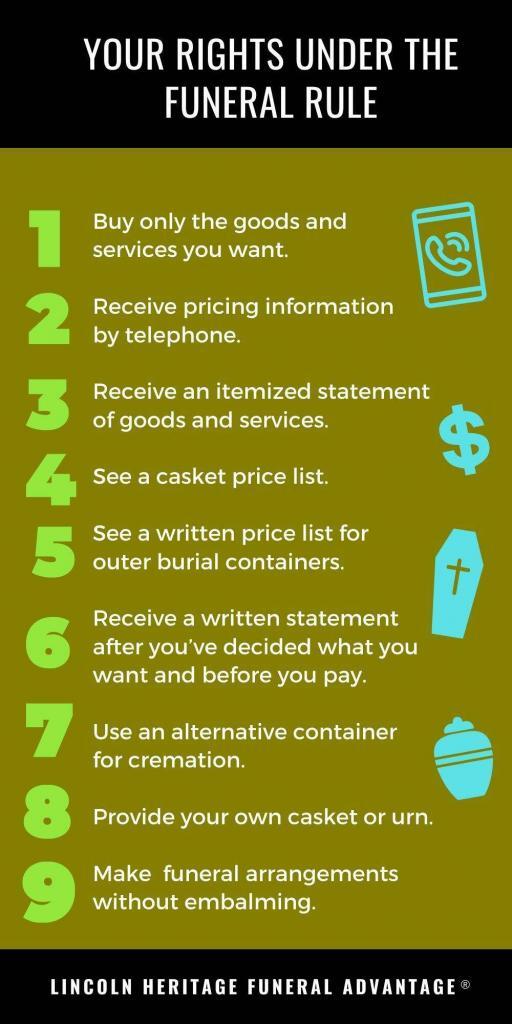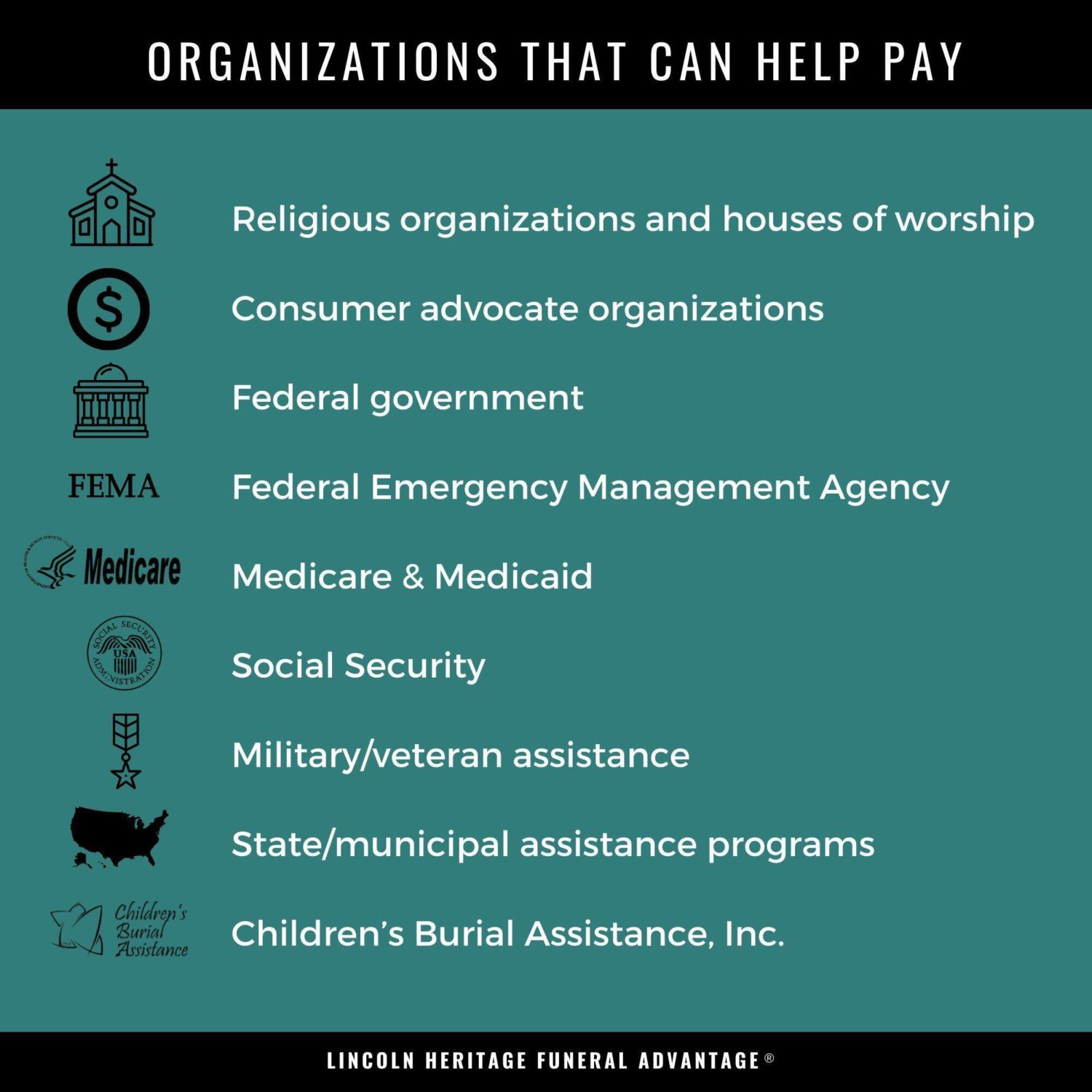Your Complete Guide to Getting Help With Funeral Costs

These include:
-
- What kind of funeral should it be?
- Which funeral home should we use?
- How much should we spend?
- Is there anything we need to buy besides a casket?
Every year, thousands of Americans struggle with these decisions and need help with funeral costs. It’s common for people to wonder where to start.
A good first step is understanding what your rights are when it comes to funeral expenses and other burial costs.
Laws regarding funerals and burials vary from state to state and understanding them can be daunting. Knowing and understanding all of your options will help reduce the stress of starting your funeral planning checklist and protect your rights when interacting with funeral homes.
This guide walks you through all of the ways you can get help with funeral costs and burial expenses from charity organizations, non-profits, government benefits, military assistance programs, and other sources. Certain types of life insurance, such as burial insurance or final expense insurance, can also help cover the rising costs of final arrangements.
Table of Contents
Your Funeral Rights
When a loved one dies, grieving family members are left with countless decisions to make about the funeral – all of which need to be made quickly. These include:
- What kind of funeral should it be?
- Which funeral home should we use?
- How much should we spend?
- Is there anything we need to buy besides a casket?
Every year, thousands of Americans struggle with these decisions and need help with funeral costs. It’s common for people to wonder where to start.
A good first step is understanding what your rights are when it comes to funeral expenses and other burial costs.
Laws regarding funerals and burials vary from state to state and understanding them can be daunting. Knowing and understanding all of your options will help reduce the stress of funeral planning and protect your rights when interacting with funeral homes. Learn more about what to do when a loved one dies.
Below is a quick list of rights and funeral planning tips that can help you with funeral expenses.
The Funeral Rule

The goal of this rule is to help consumers know their rights when it comes to funeral home costs. The Funeral Rule gives consumers the right to:
- Buy only the goods and services you want. Some funeral home providers offer package deals that may include goods and services you don’t want or need. You are not obligated to purchase any funeral package that contains items you don’t want.
- Receive pricing information by telephone. By law, funeral homes must provide pricing information for their products and services if you request it. You are not obligated to give any personal information to obtain funeral home costs.
- Receive an itemized statement of goods and services. The funeral provider must give what’s called a General Price List (GPL) that is yours to keep. It lists the individual costs of all the items and services they offer.
- See a casket price list. Funeral homes are required to show a dated, printed list of casket prices that includes containers not displayed. Often, only certain caskets are put on display in funeral showrooms (usually the best they have to offer). The printed list is intended to show you selections that may not be on display.
- See a written price list for outer burial containers. Outer burial containers (also called grave liners) surround a casket once it’s been placed in the ground. There are no state laws requiring burial containers, but many cemeteries require them to prevent a grave from caving in. Your funeral home may or may not sell such containers. If they do, it may be listed on their GPL. If it is not listed, you have the right to request a separate price list for the container.
- Receive a written statement after you’ve decided what you want and before you pay. The statement should provide a detailed overview of what is being purchased and the exact cost of each service. It should itemize each cost and provide a total. It must also inform you of any cemetery or crematory requirements that may cost additional money.
- Use an alternative container for cremation. No law requires you to use a casket for cremation. If a funeral home offers cremation services, they are required to inform you that alternative containers are available. Learn more about cremation cost information and urn costs.
- Provide your own casket or urn. By law, a funeral provider can’t refuse a casket or urn bought from an outside source. They also can’t charge a handling fee. You are not required to be present when the casket or urn is delivered to the funeral home.
- Make funeral arrangements without embalming. No state law requires embalming for every death. Some states may require embalming or refrigeration of the body if it is not buried or cremated within a certain period of time. Refrigeration is often an acceptable alternative to embalming. Services such as direct cremation and immediate burial don’t require embalming. A funeral home can’t embalm a body without your consent.
Most people have to cover the cost of their parent’s funeral and the best way to fund a funeral is by planning in advance. While a simple savings account will work, many people choose to take out life insurance policies for their parents or other aging relatives to get help with funeral costs and other bills their loved ones leave behind. If you would like to do the same for your parents, follow these steps.
Step 1 – Discuss your plans with them
When purchasing life insurance for parents, discuss the policy with them, including coverage amounts and who will pay the premiums. Explain that you are protecting your family’s financial future by making sure you can pay for their final arrangements when the time comes. Once you’ve decided on how much coverage to take out and which insurance company to use, you can move on to the next step.
Step 2 - Decide who owns the policy and who receives the benefits from it
The owner of the policy can make changes to the coverage, beneficiaries, and billing information. They also control who has access to information about the policy. If your parents will not own their own policy, it’s important to discuss that in advance.
You’ll also want to clearly define where any leftover cash goes once final expenses are paid in full by designating the policy beneficiaries correctly. If you are paying for the policy, that could be you. If you are sharing the cost with siblings, you may also split the extra funds. In some cases, your parents may want the funds to go to charity, grandchildren, or to cover other debts.
Step 3 - Purchase the right policy
Once you’ve gone over the details, it’s time to choose a policy. There are several options, and some may be better than others depending on your financial resources as well as your parents’ ages and health.
- Term Life Insurance - Term policies may cost less than other types of life insurance, however, term policies expire after a set time period. To extend coverage, you have to buy a new policy at a more expensive rate. As you age and your health changes, it may be more difficult to qualify.
- Whole Life Insurance - A whole life policy stays active from the time you sign up until you pass away. You will usually pay a higher payment for this kind of policy, so purchasing early in life while you are in good health will get you the best rates. Rates usually do not rise, even if you become ill.
- Funeral Insurance - Also known as final expense or burial insurance for seniors, this type of coverage is specifically designed to cover funeral and burial expenses. Like whole life insurance, it remains in place until you die. This type of policy offers cash benefits in smaller amounts than traditional life insurance. There is no health exam required for coverage, but you usually have to answer health questions to qualify. Funeral Advantage from Lincoln HeritageSM is the leading final expense policy in the nation and pays cash within 24 hours of an approved claim.
Charities & Non-Profit Organizations That Can Help
In the event a loved one passes away unexpectedly and without insurance, charitable and non-profit organizations can step in to help with funeral costs.
Religious Organizations
Churches and houses of worship commonly help members of their congregations cover burial costs from a benevolence fund. In some cases, these funds may also be available to members of the greater community. Larger religious organizations, like Catholic Charities USA, may also help in times of need.
Consumer Advocate Organizations
With Funeral Advantage, policyholders receive a free membership to the Funeral Consumer Guardian Society, a non-profit, consumer advocate organization whose sole mission is to help its members save money. A dedicated representative will help the member’s family price shop services in their area and help make arrangements when their loved one passes away. Members’ families can save up to $600 on cremation and up to $1,800 on traditional funerals.
Federal Government Help
If they qualify, the federal government will pay a special lump-sum payment of $255 upon a loved one’s passing. This payment amount has remained the same since 1954 even though the average funeral cost has risen every year.
Medicare & Medicaid
Neither Medicare nor Medicaid offer funeral assistance. However, you may be able to set aside up to $1,500 for you and your spouse to help with funeral costs, for a total of $3,000. You can use a medical savings account (MSA) from a private insurance company, where you can deposit the funds and designate a beneficiary to receive them upon your passing. If you want to set aside your funds tax free, you will need a qualified funeral trust. A tax preparer or attorney can set this type of account up for you. When a family member passes away, check for these types of accounts among his or her records and paperwork.
Social Security
If your spouse or parent was receiving Social Security benefits, he or she may be eligible for a one-time death benefit of $255. In most cases, the funeral home will notify the Social Security Administration (SSA) of your loved one’s passing. You can also contact them via phone at 800-772-1213 or visit an office location near you to apply for benefits. Other benefits may also be available for qualifying individuals.
Military & Veteran Assistance

To help with funeral costs, all military veterans are entitled to a free burial in a national cemetery and a grave marker. Spouses and dependent children of veterans are also entitled to a plot and marker in a national cemetery.
For veterans, there are typically no costs for opening and closing the grave, for a vault liner, or for setting the grave marker. The family is usually responsible for other funeral costs such as transportation.
Many states have established veteran cemeteries, but some commercial cemeteries offer discounts for veterans. These cemeteries sometimes offer a free plot for the veteran, but sometimes charge high fees to open and close the grave. It’s important to evaluate all of your options before choosing a commercial cemetery.
For non-service-related deaths, the US Department of Veterans Affairs (VA) will pay as much as $780 in burial expenses. To receive this amount, the deceased must have been hospitalized by the VA at the time of death. Without VA hospitalization, the VA will pay $300 toward expenses. If you do not plan to bury your loved one in a national cemetery, you could receive an additional $780 plot-interment allowance.
For service-related deaths, the VA will pay up to $2,000 toward burial expenses. For veterans buried in a VA national cemetery, the agency may also pay you back for your transportation costs. To receive reimbursement, you must meet the following requirements:
- You paid for the veteran’s funeral, AND
- Another government agency or other source has not provided reimbursement, AND
- The veteran received an honorable discharge, AND
- The veteran received a VA pension or compensation, OR
- was entitled to that compensation but chose not to use it, OR
- died while hospitalized at a VA facility or under VA contract, OR
- died while traveling for authorized treatment, OR
- had a pending claim for compensation or pension prior to death, OR
- died at a VA-approved state nursing home.
The VA does not pay burial benefits for deceased veterans who died during military service, were members of Congress who died while holding office, or were federal prisoners.
To receive payment, you must submit proof of death, receipts for funeral expenses, and a statement from the funeral director or cemetery. You may apply for benefits online, submit a paper application by mail or to a local office, or work with a representative.
In addition to funeral fees, you may be able to get military funeral benefits for your loved one at no charge from the National Cemetery Administration, including:
- a burial flag to drape the casket or accompany the urn and, thereafter, be kept as a keepsake by the next of kin,
- military funeral honors, including the folding of the flag and the playing of “Taps,” and/or
- a headstone, marker, or medallion.
For more information, read our funeral planning guide for veterans.
Disaster Relief
In the event of a natural disaster, the Federal Emergency Management Agency (FEMA) will help with funeral costs that are uninsured for immediate family members. A declared disaster or emergency must be the cause of death. Covered products and services may include:
- Casket or urn
- Mortuary services
- Transportation of the deceased and/or up to two family members into the area to identify the decedent (if required by state/local authorities)
- Up to five death certificates
- Burial plot or cremation niche
- Interment or cremation
- Marker or headstone in a public cemetery or private burial site
- Cost of reinterment, if disinterment occurs due to the declared disaster AND occurs in a family cemetery on private property
To receive funeral assistance, you must provide:
- A death certificate
- Documentation from a designated authoritative state or local entity (attending physician, medical examiner’s office, or coroner's office, as appropriate) that attributes death or the injury causing death directly to the declared emergency or major disaster
- Proof that the applicant is the responsible party for the funeral expenses
- Confirmation that funeral expenses have not been paid for by other resources (Social Security and VA benefits, for example)
- Evidence of an unmet funeral cost (a receipt from a service provider, for example)
State & Local Resources
Some states offer assistance programs for families who do not have the means to pay for funeral expenses for a loved one. When available, benefit amounts vary and are typically reserved for individuals without the means to pay for a loved one’s funeral. In almost all cases, both state and local funds available to help with funeral costs are given at the local level. In all cases, you must apply and be approved for benefits.
Alabama
The state of Alabama doesn’t provide assistance. Counties may provide up to $400 for expenses, depending on the family’s income. Apply for help at the Department of Human Resources in the county where your loved one lived. You can also read our guide to final expense and burial insurance in Alabama.
Alaska
Help in the amount of up to $2,500 is available only when a family has no other resources and only to tribal members. The General Relief Assistance (GRA) program depends on county or town of residency. Apply by contacting the Department of Health and Social Services, Division of Public Assistance.
Arizona
The state of Arizona does not provide funds. Counties provide up to $500 based on need. Apply to the local county government. You can also read our guide to final expense and burial insurance in Arizona.
Arkansas
Arkansas does not help with funeral costs at the state level. County judges can use a “Pauper’s Fund” to help with expenses. To apply, contact your county office.
California
The state of California may help with funeral expenses only for victims of crime or natural disaster. For low-income residents, counties may offer modest assistance to cover a basic funeral or cremation with a service. Contact the California Department of Health office in the county of residence to apply. You can also read our guide to final expense and burial insurance in California.
Colorado
In Colorado, funds exist at the county level. Medicaid recipients are eligible for $1,500 in aid, and Social Security recipients can receive $1,000. Contact the county Department of Human Services to apply. You can also read our guide to final expense and burial insurance in Colorado.
Connecticut
Connecticut helps pay for funeral costs up to $1,000 for people covered under Aid to Families with Dependent Children (AFDC) and Aid to the Aged, Blind, or Disabled (AABD). You must apply with the Connecticut Department of Social Services.
Delaware
In Delaware, indigent people may receive between $400 and $1,500 to be buried in a state pauper cemetery. Apply for benefits through the Delaware Division of Social Services.
Florida
The state of Florida requires the Department of Health and Human Services to provide burial for poverty-stricken individuals. You must apply for burial assistance at the county health department in the county where the deceased was a resident. You can also read our guide to final expense and burial insurance in Florida.
Georgia
Georgia does not provide government assistance to help with funeral costs. At the county level, the Department of Human Services can help eligible parties with $350 to $1,200 in funds. Contact your local Division of Family and Children Services to apply. You can also read our guide to final expense and burial insurance in Georgia.
Hawaii
The state of Hawaii’s Funeral Payments Program helps with up to $400 for funeral expenses and $400 for burial for eligible parties. Contact the Department of Human Services Med-QUEST Division to apply.
Idaho
The state of Idaho does not offer assistance. However, you may receive $700 to $1,200 from each county’s Indigent Services Department. Contact the Indigent Services office in your county prior to cremation or burial to apply.
Illinois
In Illinois, people who qualify for the following programs may receive $550 to $1,100 to help pay for final expenses:
- Temporary Assistance for Needy Families (TANF) Cash
- Aid to the Aged, Blind, or Disabled (AABD) Cash
- All Kids Assist
- Parent/All Kids Assist
- All Kids Moms & Babies
- Family Assist
- AABD Medical
- General Assistance Foster Care/Adoption Care
Make claims through the county Family Community Resource Center. You can also read our guide to final expense and burial insurance in Illinois.
Indiana
Indiana provides up to $800 for a cemetery and $1,200 for a funeral for people in specific Medicaid categories. Only a funeral home or cemetery can file on behalf of a deceased person within 90 days of death, and payment goes directly to the facility. Localities may also offer help. To apply, contact your local Family and Social Services Administration Division of Family Resources. You can also read our guide to final expense and burial insurance in Indiana.
Iowa
Iowa counties provide assistance, capped at $400, for people living in poverty prior to their death. Apply within 60 days to the Department of Human Services in the county of residence.
Kansas
Kansas offers no formal help at the state or local level. Some counties may have limited assistance upon request.
Kentucky
The state of Kentucky does not have a program to help fund funeral costs. Amount of assistance at the county level is usually less than $1,000, and may not cover opening or closing the grave. Contact your local coroner’s office for more information. You can also read our guide to final expense and burial insurance in Kentucky.
Louisiana
No formal, statewide programs exist. Contact your local parish coroner’s office for help with indigent burial.
Maine
The Maine General Assistance Program offers up to $785 for cremation or $1,125 for burial, paid directly to the funeral director who applies for help. Apply locally through your Department of Health and Human Services Family Independence office.
Maryland
People receiving aid from the Maryland Department of Human Services (DHS) may receive up to $650 in help, as long as funeral costs are not more than $2,500. Contact DHS to apply. You can also read our guide to final expense and burial insurance in Maryland.
Massachusetts
The state of Massachusetts will pay a funeral home up to $1,100 to help cover funeral costs, as long as the total cost is not more than $3,500. Funeral facilities must apply through the Department of Transitional Assistance. You can also read our guide to final expense and burial insurance in Massachusetts.
Michigan
Michigan’s Home and Burial Services program pays a max of $600 directly to a funeral home as a way to help with funeral costs. The funeral director must apply within 10 business days of death through the Department of Health and Human Services. You can also read our guide to final expense and burial insurance in Michigan.
Minnesota
Counties in Minnesota provide between $1,500 and $3,500 to cover cremation services based on financial need. Apply within 14 days of death to your loved one’s county of residence.
Mississippi
In Mississippi, limited funds are available from the county administrator’s office to help with simple cremation costs. There are no state programs.
Missouri
County or city governments in Missouri will reimburse up to $400 to someone with no family or funds as part of the collaborative Indigent Burial and Funeral Fund. Contact the Community Foundation of the Ozarks for more information. You can also read our guide to final expense and burial insurance in Missouri.
Montana
While there are no formal programs, local funeral homes may assume the cost of funeral services for indigent people. Contact your local coroner’s office for more information.
Nebraska
Counties offer limited assistance, no more than $1,000 to help cover basic services, through a General Assistance Program. Contact the deceased’s county of residence to apply.
Nevada
Nevada Health and Human Services offers assistance for direct cremation at the county level. To apply, contact the local office.
New Hampshire
In New Hampshire, the city or town will pay up to $750 directly to a funeral home for a deceased person with no family or assets. Local funeral homes can connect you to these services.
New Jersey
The New Jersey Department of Human Services will pay up to about $2,245 for a funeral and about $525 for cemetery costs. The state bases benefit amounts on need, and families may supplement the cost up to $1,570. A funeral home must make the arrangements. You can also read our guide to final expense and burial insurance in New Jersey.
New Mexico
The state of New Mexico’s Human Services Department provides up to $200 toward funeral expenses and $600 for burial expenses for people who receive financial and medical help. Assistance may also be available through funeral homes.
New York
In New York City, boroughs offer up to $900 for services not exceeding $1,700. In the rest of New York state, benefits of up to $1,250 come from counties and municipalities. Contact your county or New York City government to apply.
North Carolina
There is no statewide program in North Carolina to help with funeral costs, but some counties may offer help. You can also read our guide to final expense and burial insurance in North Carolina.
North Dakota
The North Dakota General Assistance Program will provide between $300 and $3,000 to cover a basic burial or cremation. For more info, contact the North Dakota Department of Human Services at the county level.
Ohio
Ohio counties and townships offer help for residents with an income of less than 150% of the federal poverty guidelines. Family resources also factor into eligibility. Apply at your local government office. You can also read our guide to final expense and burial insurance in Ohio.
Oklahoma
Some benefits exist at the county level and for members of Native American Nations. Contact your county administrator or the Chickasaw Nation to apply.
Oregon
The Oregon Mortuary and Cemetery Board works with licensed funeral homes to bury indigent citizens. Native American Tribes may also offer help.
Pennsylvania
The state of Pennsylvania helps with up to $750 in benefits for people already receiving Social Security or cash benefits and nursing home residents who have received assistance since 1973. Apply at your local Department of Human Services office. You can also read our guide to final expense and burial insurance in Pennsylvania.
Rhode Island
Rhode Island will pay up to $900 through their General Assistance Program based on need. Apply within 30 days of death at your local Department of Human Services office.
South Carolina
There are no benefits at the state level. County benefits cover only the cost of a basic cremation. Contact the coroner in the county of residence to apply. You can also read our guide to final expense and burial insurance in South Carolina.
South Dakota
Law requires counties in South Dakota to provide burial aid to indigent citizens. Amounts vary. Inquire at your local Department of Social Services office.
Tennessee
Residents of Nashville and Davidson County are eligible for help through the Metro Social Services office. Some other counties also offer help. Contact your county administrator’s office to inquire. You can also read our guide to final expense and burial insurance in Tennessee.
Texas
Limited assistance is available at the county level, primarily for veterans. Contact your county for details. You can also read our guide to final expense and burial insurance in Texas.
Utah
Some counties help with basic cremation at an approved cemetery. For benefit information, contact the county administrator where your loved one lived.
Vermont
Vermont’s General Assistance Program pays up to $1,100 to a funeral provider. Contact the Vermont Department of Children and Families to apply.
Virginia
Virginia offers assistance to people enrolled in Temporary Assistance for Needy Families (TANF) or Supplemental Nutrition Assistance Program (SNAP). Apply through the Virginia Department of Social Services office nearest you. You can also read our guide to final expense and burial insurance in Virginia.
Washington
Washington counties offer help of at least $300, primarily for veterans. Contact either the County Community Services Office or local Veterans Affairs department to apply.
West Virginia
West Virginia’s Indigent Burial Program will pay up to $1,250 to pay for funeral expenses based on need. For more information, contact the Department of Health and Human Resources.
Wisconsin
The Wisconsin Funeral and Cemetery Aids Program (WFCAP) will pay back up to $1,500 in funeral expenses for people enrolled in assistance programs or Medicaid. For more information or to apply, contact the Department of Human Services.
Wyoming
The Wyoming Department of Family Services (DFS) offers funeral payment assistance, usually of $500 or less. Veterans may receive more. Contact your local DFS office to apply.
Help With Funeral Costs for a Parent

Losing a parent is hard enough without worrying about how you are going to pay for a funeral service. Though it may be tough to talk about, talking to your parent can help you know where to look for help once they are gone. Ask them to clearly lay out their final wishes and to include any sources of payment. If you know about their military history, union memberships, overall financial situation and savings, and life or funeral insurance policies in advance, it will be easier to use those resources when you need them.
Help With Funeral Costs for a Child or Baby
Non-profit organizations like Children’s Burial Assistance, Inc. (CBA) help families afford the burial of a deceased, minor child between the ages of one and 17 years. Families with no life insurance and a lack of savings are eligible to apply for help.
CBA provides donated burial plots, funds for fees associated with opening and closing graves, and cremation services. The organization can also connect families with low- and at-cost funeral service providers. Funds go to funeral homes directly.
Help With Funeral Costs for Low-Income Families
Low-income families may qualify for state and local assistance programs. See the above State and Local Resources section for more information.
Low-Cost or Free Alternatives to Funerals & Burials
If you want or need to keep funeral costs low, there are several options to consider. Use one or several of these options to minimize your out-of-pocket expenditures and still memorialize your loved one.
Direct Cremation
Direct cremation, also known as a basic or simple cremation, can be one of the cheapest alternatives to traditional cremations or burials. The body of the deceased is cremated and immediately returned to the family. There is no service included in this cost, but you may hold one of your own.
DIY Funeral Service or Memorial
Family, friends, and neighbors can gather together in a home, church, or community center to honor the life of a loved one. If you want to serve food, consider a potluck-style meal where everyone brings a dish to share. This can eliminate the high cost of using a funeral home.
Body Donation
If donor acceptance criteria are met, you may be able to donate your loved one’s body to a university or private organization for medical research and educational purposes. In addition to being free or low cost, this option is also seen by many as “giving back” to society and, therefore, having a positive impact on the world, even in death. Make sure the program is an accredited member of the American Association of Tissue Banks (AATB).
Burial on Family Property
Most states allow private burials on family land. Check with your municipality to ensure you follow zoning laws and rules regarding health regulations.
FAQs
Is there funeral expense assistance available to help with with funeral costs for victims of crime?
Yes. Every state has a crime victim compensation program. Specific benefits vary by state and cover expenses not paid for by other programs. You must apply for this program in the state where the crime occurred.
Do trade or labor organizations provide help with funeral costs?
Some trade unions pay death benefits to former members, their spouses, or other family members. Find your union via the American Federation of Labor and Congress of Industrial Organizations (AFL-CIO), the Change to Win Organizing Center (CtW), or the independent labor union directly to inquire about these benefits.
Am I allowed to run a fundraising campaign to help me with funeral costs?
Yes. Fundraising has always been an option for families who need help paying for funeral services for a loved one. Bake sales, car washes, and church or social group fundraisers are a great place to start. You can also use online crowdfunding sites to increase your reach by appealing to family and friends through email and social media.
Next Steps
Funerals are like any big purchase – they require a lot of careful planning and there are lots of questions to be answered. The problem is most family members are unprepared when it comes to making many of these decisions and need help with funeral costs and other final expenses. Families often don’t know they have protected rights when working with funeral homes.
Who will be there to guide them through this process?
That’s why there are organizations like the Funeral Consumer Guardian Society (FCGS) who can help surviving family members make smarter purchase decisions.
To find out more about the kind of services the FCGS provides, click the link below.





